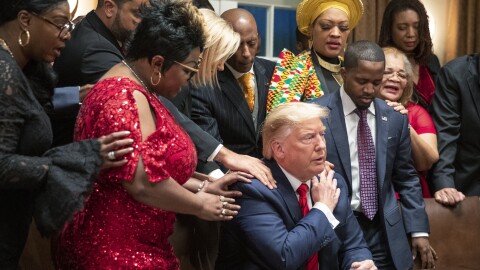President Trump loves talking about the booming stock market. It's not so clear Wall Street loves him back.
For the first time in a decade, deep-pocketed donors from the halls of finance are giving more money to Democrats than Republicans, according to the Center for Responsive Politics, a research group that tracks money in politics.
"This cycle is the first cycle we've seen in a while where the Democrats in the House and [former Vice President Joe] Biden and even to some extent the Democrats in the Senate are out-raising Republicans," says Sarah Bryner, research director at the Center for Responsive Politics.
Of nearly $800 million donated to politicians by securities firms, banks, real estate companies and their employees by June 30, slightly more than half went to Democrats.
That hardly ever happens. While Wall Street went big for Barack Obama in 2008, it switched back to the GOP following the passage of the Dodd-Frank financial overhaul bill and has been reliably Republican ever since.
Loading...
That's important, because the finance sector is by far the biggest contributor to political campaigns in the country.
President Trump still has friends in finance, such as private equity's billionaire titan Stephen A. Schwarzman, CEO of Blackstone Group, and discount online brokerage pioneer Charles Schwab. But Republican megadonor Robert Mercer of Renaissance Technologies is giving a lot less to the party this year.
Meanwhile, wallets are opening faster for Democrats this election season than they did in 2016, says Charles Myers, chairman of Signum Global Advisers, who helped raise money for Hillary Clinton four years ago.
"For people to write a $100,000 check, a $250,000 check, that would have been really extraordinary four years ago," Myers says. "Today we're seeing a lot of that."
The stock market may be hitting records, but a lot of people who work in finance have soured on Trump's management style, Myers says.
"People are just exhausted. It's hard to make medium- to long-term capital allocation decisions because you never know what his White House is going to do," he adds.
Andrew Redleaf, founder of the hedge fund company Whitebox Advisors, has been a Republican donor in the past. He gave to the campaign of 2012 presidential candidate Mitt Romney. He calls himself a libertarian conservative who favors free trade and immigration.
This year, he's given money to the Lincoln Project, a group of conservative never-Trumpers who are running scathing ads against the president in swing states.
"I'd like there to be a right-of-center, limited-government party ... which is not the Trumpist Republican Party," Redleaf says.
Redleaf is wary of Democrats and has no particular affection for Biden.
But the former vice president is a known commodity on Wall Street and is widely seen as a more centrist, acceptable alternative to more liberal Democrats who ran for president, such as Massachusetts Sen. Elizabeth Warren.
Biden has also been a top recipient of financial industry money for decades as a senator from Delaware, home to financial and credit card companies.
"He's not somebody that the industry is particularly afraid of," Bryner says. "So I think that we would see them kind of hopeful that he would be a more moderating influence, whereas Trump can be quite unpredictable."
Copyright 2022 NPR. To see more, visit https://www.npr.org.







